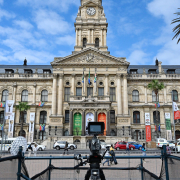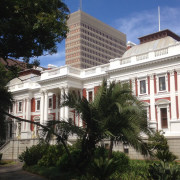|
Getting your Trinity Audio player ready...
|
By Melusi Ncala
First published on News24
In the past four years, we have witnessed an arrogant Parliament, often led by an ANC emboldened by its majority, bulldozing its way to politically satisfactory decisions at the expense of the public good and the sanctity of the offices meant to advance and safeguard democracy.
We think back to Police Minister Bheki Cele acting unlawfully during the appointment of the executive director of the Independent Police Investigative Directorate (IPID). The appointment was made well past the prescribed 12 months after Robert McBride’s contract had expired, an extension the IPID Act does not provide for and the Portfolio Committee on Police was not empowered to grant. Despite this and other concerns, as well as legal opinion that the committee had received, the appointment process continued. The attitude back then of most of the committee members was to dismiss civil society’s recommendations and not hold the minister to account for his tardy action.
Not too long after this debacle, Parliament would embark on the appointment processes of persons to lead the Commission for Gender Equality (CGE). Living up to disappointing expectations, the legislature, in a process overseen by the Portfolio Committee on Women, Youth and Persons with Disabilities, denied the public an opportunity to engage meaningfully. Much of the flaky reasoning was attributed to decision-makers adhering to the law.
In this situation, a matter pursued all the way to the apex court, President Cyril Ramaphosa accepted and appointed the recommended commissioners despite being aware of the improper way the portfolio committee had conducted itself. In essence, the committee was of the view that 10 days were sufficient to assess the applications of 24 candidates whose information was captured rudimentarily on an Excel document. No resumés were provided and the public was limited to approximately 2 000 characters to make their submissions.
Public involvement a joke to Parliament
Now, a few months before general elections, we find ourselves in yet another unconscionable set of circumstances, with the Portfolio Committee on Justice and Correctional Services blatantly ignoring the voice of civil society as it steams ahead in the appointment process of the deputy Public Protector.
This time, the committee seeks to outdo its fellow honourable members in the portfolio committee that recommended the CGE commissioners. Ordinary people were given five days – including the announcement day – to comment on a list of 44 candidates.
This period is grievously insufficient for meaningful participation. In a letter endorsed by the Public Affairs Research Institute, Equality Collective, the Public Service Accountability Monitor, and Open Secrets, Corruption Watch informed the committee of the following:
- A five-day timeframe to make comment on the suitability of applications and nominations is unreasonable and inadequate. It does not allow for meaningful engagement, thorough analysis or comprehensive feedback from stakeholders; and
- There appears to be a proclivity among certain parliamentary committees for making recommendations for appointments without providing sufficient time for a meaningful public participation process to unfold. Public participation processes are treated as tick-box exercises.
Despite the seriousness and urgency of the matter, committee members are still to acknowledge the letter, which was sent on 22 February. Instead, the committee selected a shortlist from the 44 names and entertained itself with the objection of the involvement of former Public Protector Busisiwe Mkhwebane.
No consideration has been given to the absurdity of the less than 120 hours allotted to the public to have a say about who the second-in-command will be in the office meant to protect its interests from flagrant abuse of authority and other acts of corruption and maladministration.
Let us bear in mind that the Office of the Public Protector recently suffered reputational damage because of the impeachment inquiry and its handling of the Phala Phala crime and corruption scandal.
Lip service
The question is therefore: Why is this crop of leaders willingly disregarding due process?
They act unlawfully but are well aware of the Constitutional Court’s ruling in Doctors for Life International v Speaker of National Assembly and Others that public participation is a material aspect of the lawmaking process. Therefore, Parliament is compelled to give the public reasonable time to “know about the issues” at hand and to apply itself so that relevant and important submissions can be made.
Alas, time and again, the sixth administration has been found wanting on this principle, and we have to wonder why.
Are they above the law? Are political motives more important than the rights of the citizenry and the value of the democratic instruments put in place to protect them? We must wonder what self-serving interest is gained by rushing through the deputy Public Protector’s appointment process.
Either way, for as long as the Constitution dictates the principle of public involvement, legislators, particularly of this ilk, must be held to account.
This administration’s propensity to dismiss concerns raised upon this foundational principle of the democratic state only serves as a reminder of the lip service they pay to values of accountability, openness and anti-corruption – mere weeks before we go to the polls.
Not just once or twice, but several times have they acted wrongly, with no thought for the people who put them in office. That is one of the factors the voter must keep in mind.
Melusi Ncala is Corruption Watch’s acting lead coordinator.








